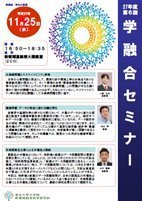AY2015 6th Gakuyugo Seminar
- Date&Time:
- Nov 25, 2015 16:50~18:35
- Venue:
- Large Lecture Room (2C0), New Frontier Science Bldg.

Minamata Disease and Sustainability Education
Associate Professor Motoharu OnukiThe Minamata disease problem has been taken up in various ways: as the origin of Japan's pollution problems, as the starting point of environmental administration and environmental engineering, as the history of overcoming the experience of pollution, and as the subject of environmental sociology and environmental ethics. It is not always known that this problem is still a very contemporary issue. The Minamata disease issue will be reexamined as a contemporary issue in sustainability studies.

Machine Learning: Exploring the Knowledge Behind the Data
Professor Masaru SugiyamaIn various fields of industry and basic science, the importance of machine learning technology for creating new value from large amounts of data is increasing. However, due to the explosive increase in the amount, dimensionality, and complexity of data to be analyzed, the research and development of data analysis methods is not keeping pace with social needs. In addition, since the most advanced data analysis algorithms are designed using extremely advanced probability theory, statistics, optimization theory, etc., it is extremely difficult to master the techniques. In this lecture, we will outline a simple and general-purpose machine learning framework.

Market monopoly strategy by brand-name drug companies
Associate Professor Takayuki Yamanaka
Patent rights and the data protection period of new drugs play an important role in the market monopoly of pharmaceuticals. This can be seen from the fact that the major agreement of the TPP in October 2015 includes "patent term extension system" and "establishment of rules for data protection period of new drugs", and that especially for the data protection period, there were tense negotiations between the US, which insists on 12 years, and Australia, which insists on 5 years, until just before the major agreement was reached. This can be seen in the tense negotiations between the United States, which insisted on a 12-year data protection period, and Australia, which insisted on a 5-year period, right up to the time of the major agreement. In this presentation, I will focus on how patent rights and data protection periods for new drugs function in the market monopoly of pharmaceuticals in Japan, and outline the market monopoly strategy by brand-name drug companies, including the latest research results.
*The contents of this page were developed based on a machine translation.

